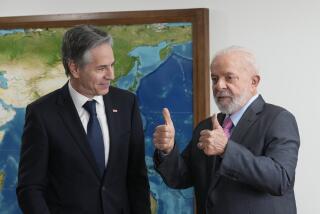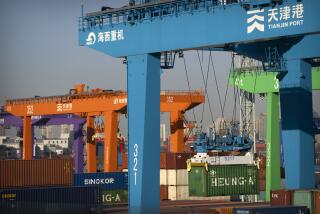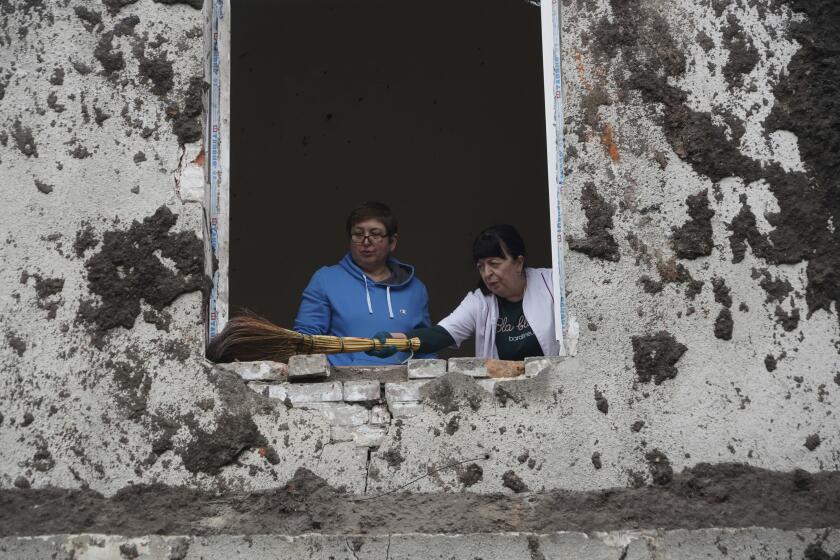At G-20, U.S. stays on the sidelines in Europe debt crisis
In one international crisis after another, the U.S. has long been front and center in leading the way out. But not this time.
As countries with economies as small as Australia’s stepped up Thursday to pledge money for Europe’s bailout fund, President Obama made no such commitment. Instead, at the summit of major world economies here, he maintained that Europe should rely on its own resources to solve the problem.
Nor has the president of the world’s largest economy said much publicly about the best path forward for the troubled Eurozone.
To some extent, the relative lack of a U.S. role here reflects the rise of other economic powers in the world, as well as Obama’s preference for a multilateral approach. But the shift also underscores the weakness of the U.S. economy and, in the eyes of some analysts, the diminished authority of America.
In 1995, the U.S. Treasury single-handedly rescued Mexico when its peso and economy collapsed. Two years later, acting through the International Monetary Fund, Washington played a crucial role in stabilizing the Asian financial crisis. And as late as the spring of 2009, a freshly inaugurated Obama arrived at a summit in London like a white knight, marshaling support for a synchronized international stimulus to avert a global meltdown.
However, some analysts and European government officials say it’s natural that Obama has had a reserved presence at the Group of 20 summit, which has been dominated by the European debt crisis.
The problems of Greece’s debt and Eurozone membership are inherently European, they say. France, Germany and other European powers have a compelling interest in resolving that problem by themselves.
“Fundamentally, it depends on Europe to clean up its own mess,” said Razeen Sally, co-director of the European Center for International Political Economy in Brussels.
French President Nicolas Sarkozy, briefing reporters Thursday after daylong summit meetings dominated by the Greek government chaos, said much the same thing: “The euro and Europe is our heritage, and we need to defend it.”
At the same time, it’s clear that Obama’s preoccupation with domestic problems at home has narrowed his options on the international stage.
Hobbled by his own nation’s debt problems and partisan warfare, he doesn’t have the political or financial means to offer his allies cash. So even as Europeans were seeking contributions for their bailout fund, most notably from China, the White House on Thursday quietly informed close partners that its commitment would be advisory rather than monetary.
But U.S. officials insisted that this shouldn’t be seen as America’s diminished clout at the summit or in the world.
“It’s our belief that our ability to contribute, our ability to lead and our ability to influence the outcome of these sorts of issues is not tied necessarily to having the American taxpayer pay for every problem,” said Michael Froman, Obama’s point person at the summit.
“One of the many things that we’re contributing to this process is our experience, ideas for moving forward based on that experience, and support in doing so,” Froman said.
Some European officials were clearly sympathetic to the American position. Undoubtedly, the political dysfunction in Washington that has resulted in partisan deadlock on major problems in the U.S. has hurt American credibility and makes it harder for Obama to push other countries to clean up their economic acts.
Yet American officials suggest that the outcome of the G-20 talks will still show the influence of the U.S.
There will be language in the summit action plan on Chinese currency, part of a broader set of steps that China and other countries running large trade surpluses will undertake to “shift their growth models” to increase domestic demand, according to one senior U.S. official.
Obama has used his leverage with the French and German leaders to push for those and other American priorities, U.S. officials said, although analysts note that it’s unlikely this summit will significantly advance the U.S. goal of rebalancing global growth.
For some analysts, the relatively modest American presence here provides more evidence of the shifting economic balance in the world, from the traditional Western powers to large emerging economies like China and India.
That in part may reflect the Obama administration’s cool reception to the idea of the Europeans reaching out to China to use some of its $3-trillion-plus reserves to expand the bailout fund.
China has remained noncommittal to supporting the fund and is not expected to make an announcement before the end of the summit Friday.
More to Read
Start your day right
Sign up for Essential California for news, features and recommendations from the L.A. Times and beyond in your inbox six days a week.
You may occasionally receive promotional content from the Los Angeles Times.








